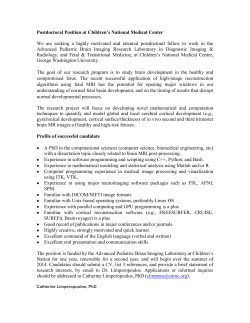
Biospace Lab Beta Imager Brochure
Real-time solutions for molecular Real-time solutions for molecular imagingimaging Beta Imager high resolution, real-time quantitative autoradiography ultrafast, real-time with multiple label option quantitative autoradiography gin ular Ima c e l o M nces euroscie N y g o l ine Pharmaco y Medic g o l o i B r Molecula ry ochemist i Genomics B t n e ironm ogy Env Cosmetol g Beta Imager Beta Imager sensitive real-time precise digital Beta Imager turns autoradiography into a fast and easy routine multiple probe discrimination Tritium detection 500 times faster than film : Tritium is a reliable beta emitter for measurement of biological samples. The problem is, detection is slow. Traditional film and phosphor imaging methods can take weeks to complete. But now, there is a better way to meet high throughput needs: Beta Imager cuts tritium imaging time from weeks to hours. A patented imaging system with unsurpassed sensitivity .detection threshold for tritium is 0.007 cpm/mm2 : very low radioactive levels can be detected .real-time imaging avoids under or over exposure and shows acquired image status at any time .direct beta counting makes results absolutely reproducible, minimizing repeat experiments .60 µm spatial resolution is reachable with an optical zoom .an exclusive patent allows simultaneous imaging and discrimination of multiple emitters .precise quantitation can be performed even at very short time A versatile technology .ideal for tritium detection in samples up to 20 cm by 25 cm .detects all other usual beta emitting isotopes (14C, 32P, 35S, 33P, 125I) .detects electrons associated with gamma isotopes with high resolution and speed (123I, 131I, 99mTc, 201Tl, 111In, ...) .detects positrons associated with PET isotopes A wide range of applications .receptors binding .whole body section .tissue sections on glass slides .any tissue sections .TLC plates .electrophoresis gels or membranes .hybridization membranes .ex vivo imaging after in vivo sessions (µSPECT, µPET) .................................... a solution for molecular imaging The very high sensitivity of the Beta Imager cuts tritium imaging from weeks to hours 4 week imaging plate acquisition (left) of rat brain sections using a 3H labeled probe compared to a 5 hour Beta Imager acquisition (right). Courtesy of Aventis Bridgewater, NJ, USA Real-time imaging provides continuously acquired image status during the experiment 1 min 5 min 15 min 60 min Distribution of D1 receptors ( [3H]SCH23390) in the rat striatum. Courtesy of Janssen Research Foundation Probe multiplexing for more in depth investigation A study of the apoptotic to healthy cells ratio in the rat heart. 201Tl is fixed by healthy cells, 99mTc Annexin is fixed by necrotic cells. Courtesy of N. Barthe, INSERM , Bordeaux, France ........................................................ Beta Imager a solution for molecular imaging Beta Imager a wide range of applications: Receptor binding A study of the NK3 receptor occupancy by a triated compound and its inactive enantiomer. Curves show the response of dose-dependent occupancy for those products and their racemic mixture. Courtesy of X. Langlois (Langlois and al, JPET 299; 712-717, 2001) TLC plate TLC plate application: Kinetic of backward reaction of His-tagged human UMP-CMP kinase (A) Time course of products formation after separation on a silica plate. The substrates are [3H]CDP plus CDP (lanes 2-4), or plus dCDP (lanes 5-7) or plusL-3TCDP (lanes 8-10) (B) Initial rates of [3H]CMP formation upon addition of dCDP or L-3TCDP. Courtesy of C. Pasti (Pasti and al, EJB 270; 1784-1790, 2003) Representative mapping of target organs for [3H]-labeled HB-19. Rats were injected with 1.8 MBq (50 µCi; 8 nmol or 20 µg) of the [3H]-labeled HB-19 at 5 min (A), 1 h (B), and 24 h (C). Midsagittal sections (A-C) and lateral sagittal section at 1 h postinjection (D) of rat whole body are shown. The spleen (E) and a section of the bone (F) regions were magnified by µ-imager. The highest concentration of radioactivity is seen in the renal inner medulla, liver, and spleen, as well as visible bone tissues (vertebra and limb). The colored scale from dark (no signal) to red (intense radioactive signal) is shown in D. • R1-DAS-Brochure-BI-D Whole body mapping ....................................................... 10, rue Mercœur, 75011 Paris, France 185 Alewife Parkway #410, Cambridge, MA 02138, USA Conception graphique Courtesy of B. Krust (B.Krust and al., PNAS 98; 14090-14095, 2001) t + 33 (0)1 55 25 60 60 | f + 33 (0)1 55 25 60 61 t + 1 909 938 9470 | f + 1 909 982 3034 (Pacific Daylight Time) info@biospacelab.com | www.biospacelab.com
© Copyright 2025









